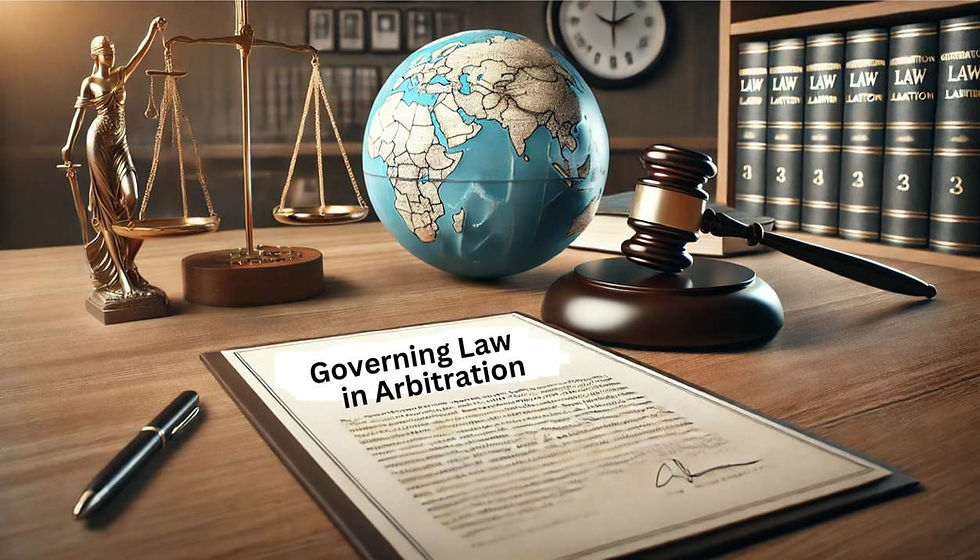Supreme Court's View in Determining the Governing Law in Arbitration Agreements
- Lawttorney.ai

- Mar 19, 2025
- 4 min read
Case Title: Disortho S.A.S. v. Meril Life Sciences Private Limited (2025)
The Supreme Court has clarified the principles for determining the governing law in arbitration agreements, particularly in international commercial contracts. The judgment emphasizes that in the absence of an express provision specifying the law governing arbitration, the applicable law should be determined based on the parties' intentions, with a strong presumption favoring the law governing the main contract (lex contracts).

Background of the Case:
The case involved an international exclusive distributor agreement signed on May 16, 2016, between Disortho S.A.S., a Colombia-based company, and Meril Life Sciences, an Indian company. Under the agreement, Disortho was granted exclusive rights to distribute Meril’s medical products in Colombia. However, disputes arose, leading Disortho to file a petition under Section 11(6) of the Arbitration and Conciliation Act, 1996, seeking the appointment of an arbitrator.
The central issue revolved around two conflicting clauses in the agreement:
Clause 16.5: Stated that the agreement would be governed by Indian law, with disputes subject to the jurisdiction of courts in Gujarat, India.
Clause 18: Provided for arbitration in Bogotá, Colombia, under the rules of the Bogotá Chamber of Commerce, with Colombian law governing the arbitration award.
Meril argued that the arbitration should be conducted in Colombia, asserting that the arbitration clauses did not give Indian courts jurisdiction to appoint arbitrators. The Supreme Court, however, analyzed the interaction between three legal systems: lex contractus (law governing the contract), lex arbitri (law governing the arbitration agreement), and lex fori (procedural law of arbitration). The Court emphasized the importance of party autonomy in determining the validity, scope, and interpretation of arbitration agreements.
Key Supreme Court Observations on Governing Law in Arbitration
A three-judge bench comprising Chief Justice of India Sanjiv Khanna, Justice Sanjay Kumar, and Justice KV Viswanathan analyzed whether Indian courts had jurisdiction to appoint an arbitrator despite the arbitration venue being in Colombia.
The Court made the following key observations:
Importance of the Governing Law – The Court reiterated that the governing law of the arbitration agreement is usually inferred from the law governing the main contract unless there is a clear contrary intention.
Clarification on Conflicting Clauses – The Court observed that while Clause 18 mentioned arbitration in Bogotá, it did not override Clause 16.5, which explicitly stated that Indian law governed the agreement. The designation of Bogotá as the arbitration venue did not automatically confer jurisdiction on Colombian courts to appoint arbitrators.
Three-Step Test for Determining Governing Law – The Court applied the three-step test from the Sulamérica Case to resolve the issue:
Express Choice: If parties have explicitly agreed on the governing law for arbitration, that law applies.
Implied Choice: If there is no express choice, the law governing the main contract is presumed to apply.
Closest and Most Real Connection: If neither express nor implied choice exists, the law most closely connected to the arbitration agreement applies.
Since no express governing law for arbitration was mentioned, the Court held that Indian law applied as the implied choice, as the main contract was governed by Indian law.
Supervisory Jurisdiction of Indian Courts – The Court emphasized that even if arbitration is conducted in a foreign country, Indian courts can exercise supervisory jurisdiction if the governing law of the arbitration agreement is Indian law. This means that the Indian courts retain the power to appoint arbitrators under Section 11 of the Arbitration and Conciliation Act, 1996.
Harmonization of Conflicting Clauses – The Court stressed the importance of harmonizing contractual clauses instead of invalidating any of them. It held that both Clause 16.5 and Clause 18 could coexist Colombia could serve as the arbitration venue while Indian courts retained jurisdiction over the arbitration process.
Final Judgment
The Supreme Court concluded that Indian law governs the arbitration agreement, and therefore, Indian courts have the authority to appoint arbitrators. The Court also noted that both parties agreed during the proceedings that if the petition was allowed, arbitration could take place in India.
Based on this consensus, the Court made the following rulings:
Appointment of Arbitrator: The Court appointed Justice S.P. Garg (Retd.), former judge of the Delhi High Court, as the sole arbitrator.
Arbitration Rules: The arbitration shall be conducted under the rules of the Delhi International Arbitration Centre.
Venue for Arbitration: The parties and the arbitrator shall mutually decide the venue for arbitration.
Fee Schedule: The fee schedule for international arbitrations at the Delhi International Arbitration Centre shall apply.
Conclusion
This ruling reinforces that the governing law of the main contract plays a crucial role in determining the law applicable to the arbitration agreement. The Supreme Court upheld the jurisdiction of Indian courts in international arbitration cases where Indian law governs the agreement. It also reaffirmed the importance of harmonizing conflicting contractual clauses to uphold party autonomy.
By resolving these issues, the judgment provides much-needed clarity for international commercial contracts, ensuring that arbitration agreements are interpreted in a manner that reflects the parties' true intentions.
Empower Your Legal Practice with AI
Are you a legal professional? Stay ahead with our innovative Lawttornet.AI tool. Streamline your legal processes, enhance productivity, and gain a competitive edge. Experience the future of legal technology—try our free Webinar session today!




Comments